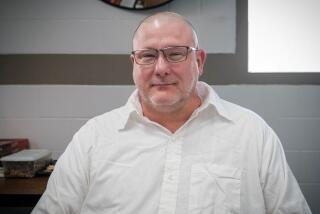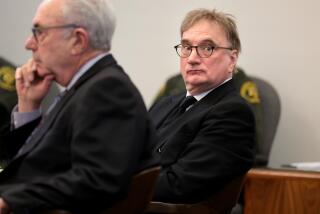Doctors assist in executions despite ethics rules
For more than 50 executions, Missouri relied on Dr. Alan Doerhoff to assist. Doerhoff, 70, said he became involved in the 1970s when the warden at the prison that handled executions retained him because they had been childhood friends.
------------
FOR THE RECORD
An earlier version of this post said Dr. Alan Doerhoff had assisted with Missouri executions for more than 50 years. He has been involved in more than 50 executions, not executions over 50 years. Also, the article said that Ohio death row inmate Dennis McGuire, executed on Jan. 16, complained, “I feel my whole body burning.” It was Oklahoma death row inmate Michael Wilson, executed in Oklahoma on Jan. 9, who said that.
------------
Back then, Missouri was using a gas chamber. Doerhoff recalled that inmates suffered a “hideous” death — writhing, choking, vomiting. The warden expressed interest in a new method: lethal injection. Doerhoff, who by then had been practicing general surgery for 20 years, agreed that it seemed more humane.
“I was the only board-certified surgeon there to do it,” Doerhoff said. “No other state had a doctor involved.”
Doctors have been involved in lethal injections from the start. A doctor advised lawmakers on designing Oklahoma’s lethal injection law and procedure in 1977, the first in the nation, which other states used as a template.
A doctor was expected to participate in Missouri’s latest execution Wednesday, of convicted murderer Russell Bucklew. It was scheduled amid a furious debate after last month’s botched lethal injection in Oklahoma, in which the inmate took more than 43 minutes to die.
Bucklew, 45, suffers from a chronic illness, cavernous hemangioma, which creates tumors in his head and face that easily rupture. His attorney argued that lethal injection could trigger massive bleeding, or that the disorder could prevent the drugs from properly circulating, making his death long and painful.
“My client’s at risk of suffocating to death if his airway closes down — coughing, choking on his own blood, having a repeat of what happened in Oklahoma,” attorney Cheryl Pilate said. “It’s kind of terrifying.”
At 10:30 p.m. Central time Tuesday, less than two hours before Bucklew’s death warrant would have taken effect, U.S. Supreme Court Justice Samuel A. Alito Jr. stayed the execution until further order of the court.
At the time, Bucklew was in a holding cell about 50 feet from the death chamber, a corrections spokesman said.
“We have to let the wheels of justice turn as quickly or slowly as they can,” said the spokesman, Mike O’Connell.
Missouri Atty. Gen. Chris Koster, who had opposed the stay, said in a statement that the court was expected to consider the issue Wednesday and that the death warrant remains valid until midnight Wednesday.
Earlier in the evening, a spokesman for the attorney general’s office defended the state’s ability to handle executions humanely, saying, “More than 100 statements from eyewitnesses to Missouri’s previous executions, included in the state’s recent federal court filings, support the position that Missouri’s executions using pentobarbital have been rapid and painless.”
A spokeswoman for Gov. Jay Nixon’s office also defended Missouri’s execution method, saying that it “has been upheld by the courts and used by the Department of Corrections to fulfill its obligation under the law and carry out these sentences for the most heinous of crimes in an effective and humane manner.”
Enlisting medical personnel in executions has become increasingly important as states have botched the procedures after switching lethal injection drugs because of shortages. There have been problems with the injections, and inmates have struggled and complained of a burning feeling.
A group of legal experts called the Death Penalty Committee of the Constitution Project recently recommended that doctors or other medical personnel supervise all medical aspects of executions, even when barred by their governing bodies.
On Monday, several Harvard Medical School doctors responded with a scathing article in the Journal of the American Medical Assn., in which they recommended that medical boards revoke such doctors’ certification.
Many medical societies and credentialing boards bar doctors from participating in executions for ethical reasons. But states shield the doctors’ identities, making it difficult for boards to investigate.
Critics note that some doctors whose identities have been exposed had spotty records, and insist that condemned inmates have a right to know who the doctors are.
They say Doerhoff illustrates the problem.
In 2006, the St. Louis Post-Dispatch revealed that he had been a magnet for malpractice suits and that two hospitals had revoked his privileges.
Doerhoff later testified that he was dyslexic and sometimes gave condemned inmates smaller doses of a sedative than the state’s lethal injection protocol demanded.
A federal judge barred him from participating “in any manner, at any level, in the state of Missouri’s lethal injection process.”
In an interview this week, however, Doerhoff insisted that he was not dyslexic and that “there were no failures until the lawyers got involved. They had to make up something to find a problem.”
In response to the controversy, Missouri lawmakers passed a measure that concealed the identity of execution team members, allowed them to sue anyone who identified them, and barred licensing boards from disciplining them.
Other states have since refused to identify doctors involved in executions, said Deborah Denno, a professor at Fordham Law School and a death penalty expert. That makes oversight nearly impossible, she said.
In Missouri, the execution team includes an unidentified, board-certified anesthesiologist, referred to in court proceedings as “M3.”
The American Board of Anesthesiology considers participating in executions an ethics violation for doctors and grounds to revoke certification.
The American Medical Assn. also has a policy barring doctors from participating in executions on ethical grounds.
“Physicians are healers. That knowledge should be used only for healing, not executions,” said Dr. Susan Dorr Goold, a professor of internal medicine and health management and policy at the University of Michigan who is on the AMA’s Council on Ethical and Judicial Affairs. “Participation as a physician is not ethical.”
The American Civil Liberties Union of Missouri filed a complaint with the anesthesiology board, but a board spokeswoman said it could not act without the doctor’s name.
“You really wonder why they’re doing it. Who are these people? We should have the best doctors involved in the execution process, not the worst,” Denno said.
Last month, an unidentified doctor presided over the botched Oklahoma execution of Clayton Lockett, 38, who writhed and moaned before he died, according to witnesses. Prison officials later said that his vein had collapsed and that he had died of a heart attack. Oklahoma officials refused to identify the doctor.
In Ohio, where another botched execution led to the prolonged death of convicted rapist and murderer Dennis McGuire on Jan. 16, the lethal injection was carried out by an unidentified coroner and medical team. McGuire, 53, took 25 minutes to die, gasping for air, clenching his fists and complaining, “I feel my whole body burning.”
Texas, the busiest execution state in the country, requires that the execution team include someone who is “medically trained,” such as a medical assistant, emergency medical technician, phlebotomist, paramedic or military corpsman.
molly.hennessy-fiske@latimes.com
Hennessy-Fiske reported from Houston and Klamann from Bonne Terre, Mo.
Execution doctors: An article in the May 21 Section A about doctors’ involvement in executions said Dr. Alan Doerhoff had assisted with Missouri executions for more than 50 years. He has been involved in more than 50 executions, not executions over 50 years. Also, the article said that Ohio death row inmate Dennis McGuire, executed on Jan. 16, complained, “I feel my whole body burning.” It was Oklahoma death row inmate Michael Wilson, executed in Oklahoma on Jan. 9, who said that.
More to Read
Start your day right
Sign up for Essential California for news, features and recommendations from the L.A. Times and beyond in your inbox six days a week.
You may occasionally receive promotional content from the Los Angeles Times.







